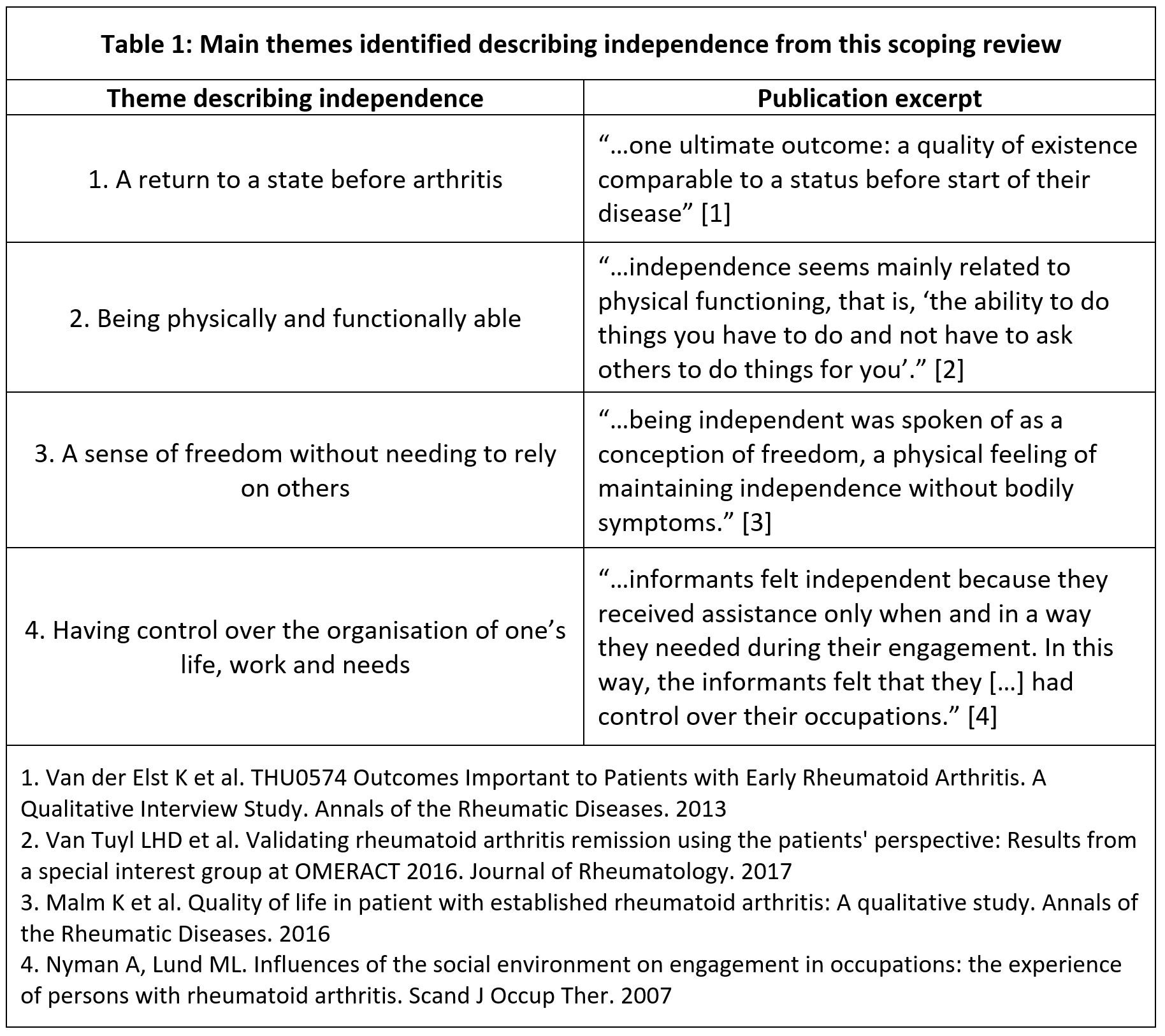Session Information
Session Type: Poster Session A
Session Time: 1:00PM-3:00PM
Background/Purpose: The current goal of treatment in rheumatoid arthritis (RA) is clinical remission, which according to the ACR/EULAR 2011 definition, is based on tender and swollen joint counts, an inflammatory marker (CRP) and a patient global assessment rating. Concerns have previously been raised that this may not capture the patient perspective adequately.
The Outcome Measures in Rheumatology Trials (OMERACT) Remission in RA patient perspective working group has previously found that patients prioritised independence, pain and fatigue as key domains of remission in RA. However, thus far there has been no clear definition of independence and consequently, this scoping review aimed to explore how independence is represented in the RA literature.
Methods: A comprehensive search of EMBASE, Medline and PsycInfo databases was performed for publications using independence or autonomy as a disease activity measure, description of disease in remission or treatment outcome. Papers were included if they involved adult participants and were written in English. No restrictions were imposed on study design or publication year. Hand searching of reference lists identified additional publications of interest. A PRISMA diagram summarising this process is shown in Figure 1. Two reviewers (TK & BJ, AC or AT) independently screened the abstracts. A thematic approach was applied to derive common definitions and descriptions of independence.
Results: 660 articles were identified, of which 58 (25 qualitative, 28 quantitative, one mixed and four reviews) met the inclusion criteria. 86% of total participants were female. Thirty-seven papers involved patients from countries where English is the official language or widely spoken. Ten publications referenced remission. Independence took many forms; in addition to physical and functional capability, it was also described in relation to work, social activities, autonomy in healthcare, and household activities. Four common themes describing independence were identified:
1. A return to a state before arthritis
2. Being physically and functionally able
3. A sense of freedom without needing to rely on others
4. Having control over the organisation of one’s life, work and needs
Exemplar statements of each theme are shown in Table 1. Theme 2 was the most common description of independence but themes 3 and 4, notably, were described even in the absence of complete physical or functional ability. This may be important particularly for patients who have irreversible deformities or disability from RA but prioritise a psyche of independence and the ability to control situational factors such as adjusting one’s work schedule, using assistive devices or receiving help from others only when requested.
Conclusion: Although independence is frequently mentioned in the RA literature, it has various meanings, lacks a consistent definition, and is a concept rarely applied to remission. It is multi-factorial, exceeding functional ability alone, and contextualised within sociodemographic and disease factors. This scoping review provides common descriptions of independence to inform future qualitative work towards the development of an outcome measure of independence for the assessment of remission in RA.
To cite this abstract in AMA style:
Khoo T, Jones B, Chin A, Terrett A, Voshaar M, Hoogland W, March L, Beaton D, Gazel U, Shea B, Tugwell P, Flurey C, Proudman S. Should Independence Play a Role in Assessing Remission in Rheumatoid Arthritis? [abstract]. Arthritis Rheumatol. 2022; 74 (suppl 9). https://acrabstracts.org/abstract/should-independence-play-a-role-in-assessing-remission-in-rheumatoid-arthritis/. Accessed .« Back to ACR Convergence 2022
ACR Meeting Abstracts - https://acrabstracts.org/abstract/should-independence-play-a-role-in-assessing-remission-in-rheumatoid-arthritis/


